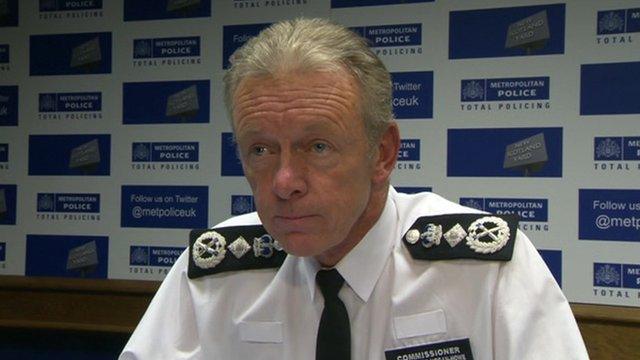Cherry Groce: Mum's police shooting 'robbed me of my childhood'
- Published
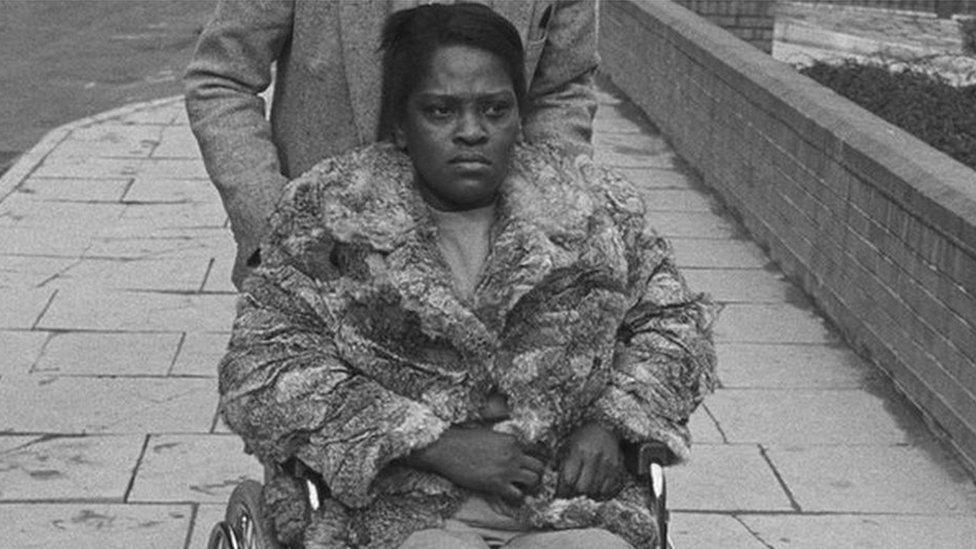
Cherry Groce died in April 2011, having spent 26 years in a wheelchair
Lee Lawrence was just 11 years old when his life changed forever.
He had fallen asleep in his mother's room and was awoken by a loud noise. She went to investigate but moments later he heard a gunshot.
His mother, Dorothy "Cherry" Groce, had been mistakenly shot by police officers in an incident which left her paralysed and sparked the Brixton Riots of 1985.
Now 45, Lee remembers his mother crying out that she could not breathe - words which now resonate with those uttered by the black American George Floyd as a police officer knelt on his neck in Minneapolis, Minnesota.
Like Floyd's death, which saw people take to the streets around the world, Cherry's shooting led to unrest.
But once the riots - or uprising as Lee calls it - died down, he was left with the "huge responsibility" of being a young carer for his mother, who was now in a wheelchair.
"It changed my life forever and robbed me of my childhood," he said. "Just two weeks later I was back at school, we had no therapy for what happened and no one spoke to us about it, so when I went to school no teacher ever spoke to me about it, no one ever said 'how do you feel' about what happened."
Lee Lawrence: "I saw my mum laying on the floor and there was a man pointing a gun"
Officers from the Metropolitan Police had been searching for his older brother Michael Groce, who was suspected of being involved in a robbery.
He was never charged over the robbery, but was given a suspended sentence for a firearms offence.
Cherry Groce, then 37, was shot in the shoulder, leaving her paralysed from the chest down.
She died of kidney failure in 2011, aged 63, and in 2014 a jury inquest found that police failures contributed to her death.
Then Metropolitan Police Commissioner Sir Bernard Hogan-Howe apologised "unreservedly" for their failings and "the years of suffering" the shooting caused the family.
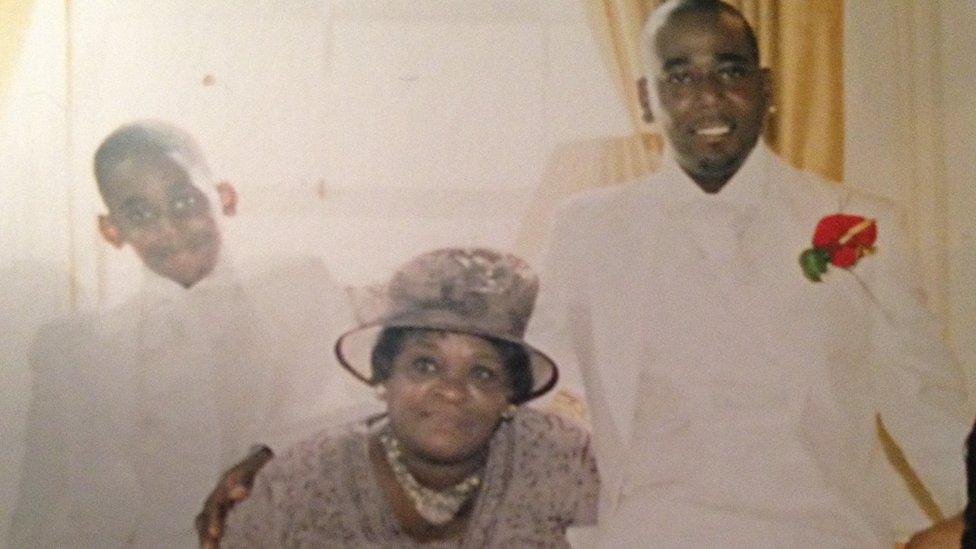
From left to right: Lee's son, Cherry Groce, Lee Lawrence
While as an 11-year-old he did not understand it, Lee said he now saw that "racism was at the core" of the incident.
"I never really understood why until 26 years later, until after my mum had passed and there was an inquest into her death which allowed us to reinvestigate what happened.
"For me I feel, knowing now what I know through the evidence that we managed to have access to, that racism was at the core of what happened. And because of how the police viewed black people, especially at that time, all the normal checks that they would do or should have done went out of the window."
Figures suggest that a disproportionate number of people who died in custody in the UK are black, while reports have found Met Police officers are more likely to use force against black people.
Her life was 'robbed'
Watching the protests around the world, George Floyd's final words were all too familiar for Lee.
"I [remember hearing] my mum saying in a faint voice that she can't breathe, she can't feel her legs, and she thought she was going to die."
Lee, who lives in London, says he doesn't believe policing has improved.
"I'm 45 years old, and still, if I'm driving and I see the police in my rear view mirror I'm thinking, okay am I going to get stopped? I still think that."
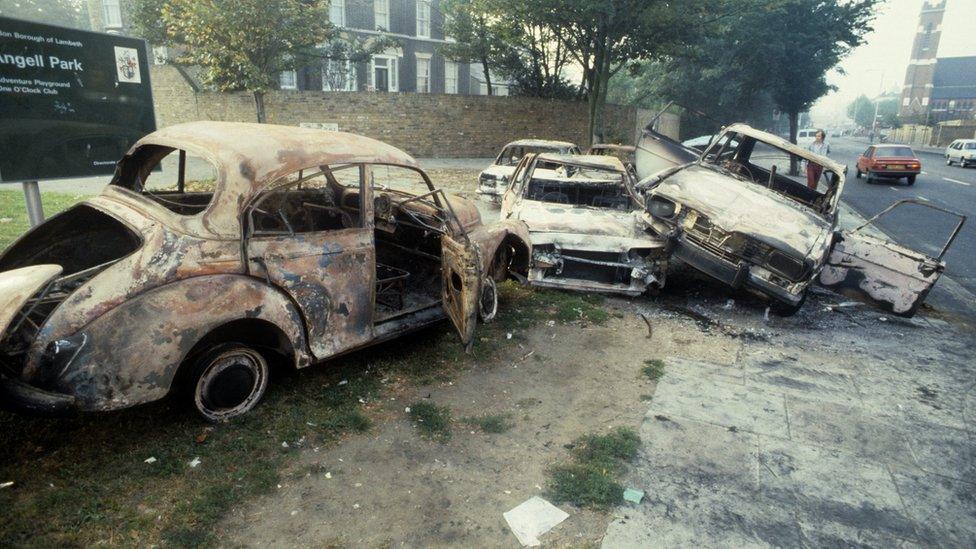
Cherry Groce's shooting by police led to the 1985 Brixton riots
"I still feel we have a long way to go," he added.
Lee, who is chief executive of Mobility Taxis, said his son Brandon, 24, has been stopped and harassed by police in Hertfordshire over a query about insurance.
Brandon called his dad to ask him to explain to the officers that he was covered, but Lee said even after he had they did not seem satisfied.
"I was getting quite upset to the point where my son was saying to me, 'dad, calm down.'
"But I was upset more because I thought okay, this happened to my mum. I've been through certain things with the police and had my own experiences.
"And now I've got my son - that's three like generations of harassment. So it was really hurtful."
The Hertfordshire Constabulary didn't comment specifically on the alleged incident, but urged Lee to get in touch with them, saying they have a panel with members of the public on who can scrutinise their stop and search scheme.
'My main inspiration'
Since the death of his mother in 2011, Lee set up the Cherry Groce Foundation to focus on restorative justice - the process his family received during his mother's inquest.
"To this day she is my main inspiration," he said. "She was a true example of a strong black woman. She was the matriarch.
"She gave whatever little she had to whoever she could."
His brother Michael, who was not at the house on the night of the shooting, has since changed his ways, turning to community work and poetry, external.
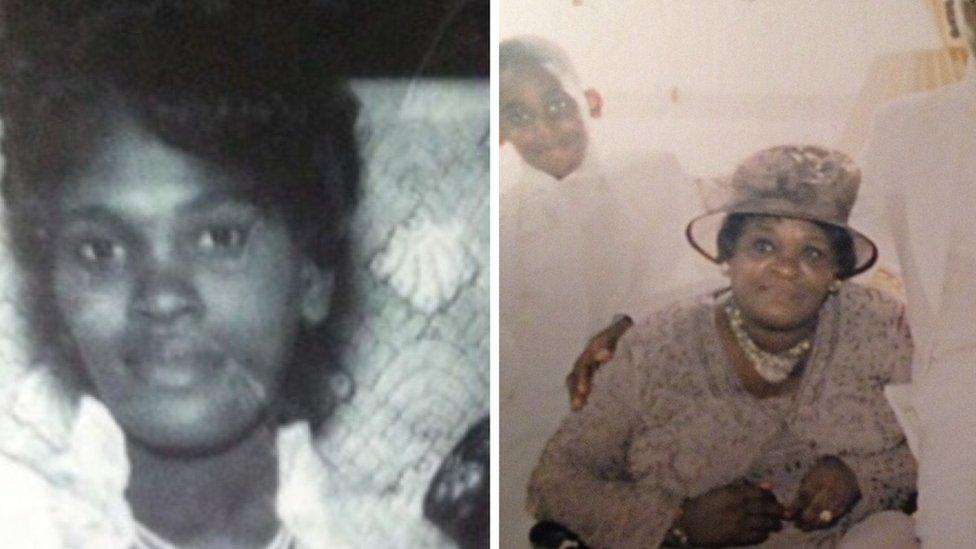
Dorothy "Cherry" Groce
Lee is also writing a book and opening a memorial in September to mark 35 years since the shooting.
The injustices suffered by the black British community is something he thinks should be taught in schools.
"For the first time in my life there's now a sense of awareness around these issues," he said.
"There are people now asking: how can we learn more about this?"
Listen to Lee's story on The Next Episode podcast on BBC Sounds
- Published10 July 2014
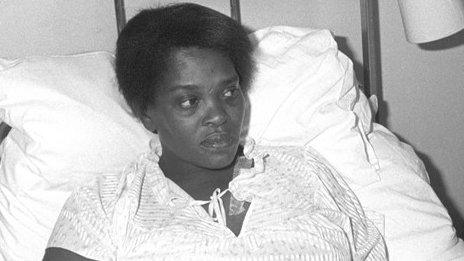
- Published10 July 2014
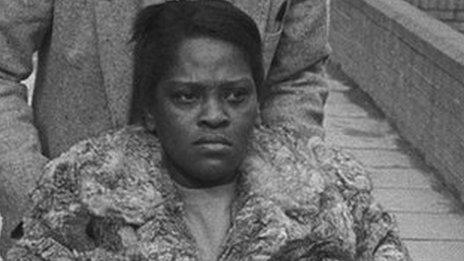
- Published10 July 2014
